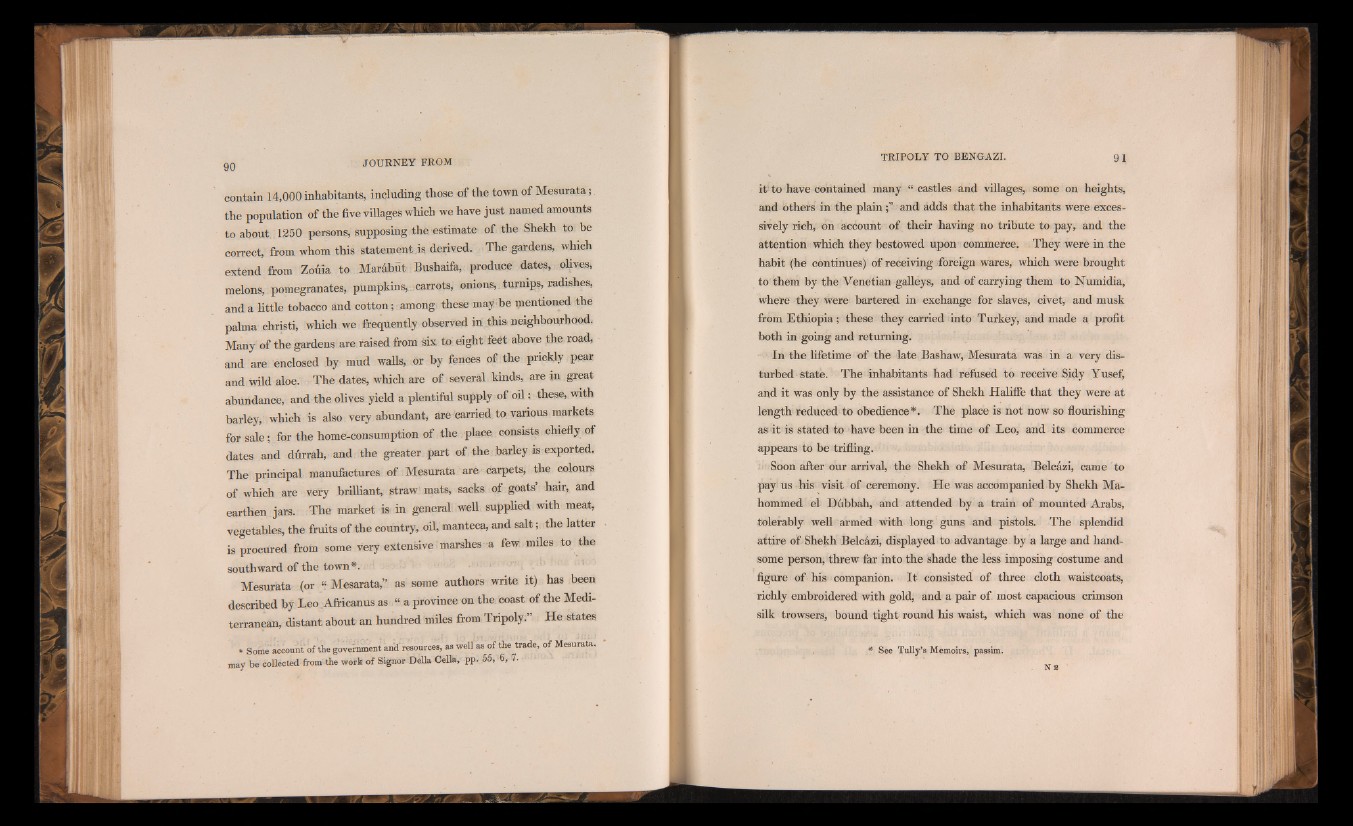
contain 14,000 inhabitants, including those of the town of Mesurata;
the population of the five villages which we have just named amounts
to about 1250 persons, supposing the estimate of the Shekh to be
correct, from whom this statement.is derived. The gardens, which
extend from Zoi'iia to Marabut Bushaifa, produce dates, olives,
melons, pomegranates, pumpkins, carrots, onions, turnips, radishes,
and a little tobacco and cotton; among these may Be mentioned the
palma christi, which we frequently observed in this neighbourhood.
Many of the gardens are raised from six to eight feet above the road,
and are enclosed by mud walls, or by fences of the prickly pear
and wild aloe. The dates, which are of several kinds, are in great
abundance, and the olives yield a plentiful supply of oil: these, with
barley, which is also very abundant, are carried to various markets
for sale; for the home-consumption of the place consists, chiefly of
dates and durrah, and the greater part of the barley is exported.
The principal manufactures of Mesurata are carpets, the colours
of which are very brilliant, straw mats, sacks of goats’ hair, and
earthen jars. The market is in general well, supplied with meat,
vegetables, the fruits of the country, oil, manteca, and salt; the latter
is procured from some very extensive marshes a few miles to the
southward of the town*.
Mesurata (or “ Mesarata,” as some authors write it) has been
described by Leo Africanus as a province on the coast of the Mediterranean,
distant about an hundred miles from Tripoly.” He states
. S o m e account of the government arif resources, as well as of the trade, of Mesurata,
may be collected from-the work of Signor Della Celia, pp. 55, >6, 7.
i t to have contained many “ -castles and villages, some on heights,
and others in the p l a i n a n d adds that the inhabitants were excessively
rich, on account of their having no tribute to pay, and the
attention which they bestowed upon commerce. They were in the
habit (he continues) of receiving foreign wares, which were brought
to them by the Venetian galleys, and of carrying them to Numidia,
where they were bartered in exchange for slaves, civet, and musk
from Ethiopia; these they carried into Turkey, and made a profit
both in going and returning.
In the lifetime of the late Bashaw, Mesurata was in a very disturbed
state. The inhabitants had refused to receive Sidy Yusef,
and it was only by the assistance of Shekh Haliffe that they were at
length reduced to obedience*. The placéis not now so flourishing
as it is stated to have been in the time of Leo, and its commerce
appears to be trifling.
Soon after our arrival, the Shekh of Mesurata, Belcázi, came to
pay us his visit of ceremony. He was accompanied by Shekh Ma-
hommed el Diibbah, and attended by a train of mounted Arabs,
tolerably well armed with long guns and pistols. The splendid
attire of Shekh Belcázi, displayed to advantage by a large and handsome
person, threw far into the shade the less imposing costume and
figure of his companion. I t consisted of three cloth waistcoats,
richly embroidered with gold; and a pair of. most capacious crimson
silk trowsers, bound tight round his waist, which was none of the
* See Tully’s Memoirs» passim.